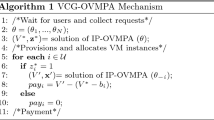Abstract
Virtualization is widely used in cloud computing environments to efficiently manage resources, but it also raises several challenges. One of them is the fairness issue of resource allocation among virtual machines. Traditional virtualized resource allocation approaches distribute physical resources equally without taking into account the actual workload of each virtual machine and thus often leads to wasting. In this paper, we propose a virtualized resource auction and allocation model (VRAA) based on incentive and penalty to correct this wasting problem. In our approach, we use Nash equilibrium of cooperative games to fairly allocate resources among multiple virtual machines to maximize revenue of the system. To illustrate the effectiveness of the proposed approach, we then apply the basic laws of auction gaming to investigate how CPU allocation and contention can affect applications’ performance (i.e., response time), and its effect on CPU utilization. We find that in our VRAA model, the fairness index is high, and the resource allocation is closely proportional to the actual workloads of the virtual machines, so the wasting of resources is reduced. Experiment results show that our model is general, and can be applied to other virtualized non-CPU resources.









Similar content being viewed by others
References
Padala, P., Hou, K.-Y., Shin, K.G., Zhu, X., Uysal, M., Wang, Z., Singhal, S., Merchant, A.: Automated control of multiple virtualized resources. In: Proceedings of the European Conference on Computer Systems (EuroSys), pp. 13–26 (2009)
Urgaonkar, B., Pacifici, G., Shenoy, P., Spreitzer, M., Tantawi, A.: An analytical model for multi-tier Internet services and its applications. In: Proceedings of the ACM International Conference on Measurement and Modeling of Computer Systems (SIGMETRICS), vol. 33, pp. 291–302 (2005)
Zhang, Q., Cherkasova, L., Smirni, E.: A regression-based analytic model for dynamic resource provisioning of multi-tier application. In: Proceedings of the 4th Int. Conf. on Autonomic Computing and Communications (ICAC), pp. 27–37 (2007)
Watson, B.J., Marwah, M., Gmach, D., Chen, Y., Arlitt, M., Wang, Z.: Probabilistic performance modeling of virtualized resource allocation. In: Proceedings of International Conference on Autonomic Computing (ICAC), pp. 99–108 (2010)
Jiang, C., Xu, X., Zhang, J., Li, Y., Wan, J.: Resource allocation in contending virtualized environments through VM performance modeling and feedback. In: Proceedings of 2011 6th Annual ChinaGrid Conference (ChinaGrid), pp. 196–203 (2011)
Maille, P., Tuffin, B.: Analysis of price competition in a slotted resource allocation game. In: Proceedings of 27th Annual IEEE International Conference on Computer Communications (INFOCOM), pp. 888–896 (2008)
Key, P., Mcauley, D.: Differential QoS and pricing in networks: where flow-control meets game theory. IEEE Proc. Softw. 146(1), 39–43 (1999)
Grosu, D., Chronopoulos, A.T., Leung, M.Y.: Load balancing in distributed systems: an approach using cooperative games. In: Proceedings of IEEE International Parallel and Distributed Processing Symposium(IPDPS), pp. 52–61 (2002)
Fang, Z., Bensaou, B.: Fair bandwidth sharing algorithms based on game theory frameworks for wireless ad-hoc networks. In: Proceedings of 23rd Annual IEEE International Conference on Computer Communications (INFOCOM), pp. 1284–1295 (2004)
Buyya, R., Abramson, D., Giddy, J., Stockinger, H.: Economic models for resource management and scheduling in grid computing. J. Concurr. Comput., Pract. Exp. 14, 1507–1542 (2002)
Ghosh, P., Roy, N., Basu, K., Das, S.K.: A game theory based pricing strategy for job allocation in mobile grids. In: Proceedings of the 18th IEEE International Parallel and Distributed Processing Symposium (IPDPS), pp. 82–91 (2004)
Ghosh, P., Roy, N., Basu, K., Das, S.K., Basu, K.: A pricing strategy for job allocation in mobile grids using a non-cooperative bargaining theory framework. J. Parallel Distrib. Comput. 65, 1366–1383 (2005)
Rzadca, K., Trystram, D., Wierzbicki, A.: Fair game-theoretic resource management in dedicated grids. In: Proceedings of the Seventh IEEE International Symposium on Cluster Computing and the Grid (CCGrid), pp. 343–350 (2007)
Ghosh, P., Das, S.K.: Mobility-aware cost-efficient job scheduling for single-class grid jobs in a generic mobile grid architecture. Future Gener. Comput. Syst. 26(8), 1356–1367 (2010)
Yolken, B., Bambos, N.: Game based capacity allocation for utility computing environments. Telecommun. Syst. 47, 165–181 (2011)
Wei, G., Athanasios, V., Zheng, Y., Xiong, N.: A game-theoretic method of fair resource allocation for cloud computing services. J. Supercomput. 54(2), 252–269 (2009)
Ardagna, D., Panicucci, B., Passacantando, M.: A game theoretic formulation of the service provisioning problem in cloud systems. In: Proceedings of the 20th international conference on World Wide Web (WWW), pp. 177–186 (2011)
Niyato, D., Vasilakos, A., Kun, Z.: Resource and revenue sharing with coalition formation of cloud providers: game theoretic approach. In: Proceedings of IEEE/ACM International Symposium on Cluster Cloud and Grid Computing, pp. 215–224 (2011)
Gui, C., Jian, Q., Wang, H.: Repeated game theory based penalty incentive mechanism in Internet-based virtual computing environment. J. Softw. 21(12), 3042–3055 (2010)
Ma, R.T.B., Lee, S.C.M., Lui, J.C.S.: Incentive and service differentiation in P2P networks: a game theoretic approach. IEEE/ACM Trans. Netw. 14(5), 978–991 (2006)
Acknowledgements
The funding supports of this work by Natural Science Fund of China (Nos. 61003077, 60873023 and 60973029), State Key Development Program of Basic Research of China (No. 2007CB310906), Natural Science Fund of Zhejiang Province (Nos. Y1090940, Y1101092, Y1101104), and Research Fund of Department of Education of Zhejiang Province (No. GK100800010) are greatly appreciated.
Author information
Authors and Affiliations
Corresponding author
Rights and permissions
About this article
Cite this article
Jiang, C., Duan, L., Liu, C. et al. VRAA: virtualized resource auction and allocation based on incentive and penalty. Cluster Comput 16, 639–650 (2013). https://doi.org/10.1007/s10586-012-0235-6
Received:
Accepted:
Published:
Issue Date:
DOI: https://doi.org/10.1007/s10586-012-0235-6




